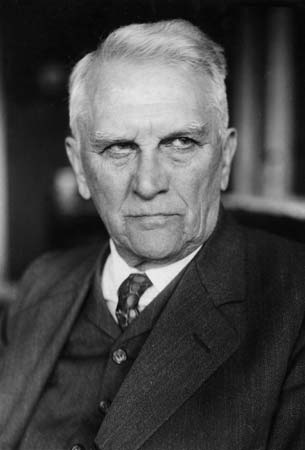Ledebour, Georg
German politician
born March 7, 1850, Hannover, Hanover 【Germany】
died March 31, 1947, Bern, Switzerland
 German socialist politician who was radicalized by the outbreak of war in 1914 and became a leader of the Berlin communist uprising of January 1919.
German socialist politician who was radicalized by the outbreak of war in 1914 and became a leader of the Berlin communist uprising of January 1919.A Social Democratic Party (Social Democratic Party of Germany) member of the Reichstag (national parliament) from 1900, Ledebour initially stood among the left centrists of his party. However, with the outbreak of World War I, he and his fellow socialist Hugo Haase formed a solitary opposition to the voting of German war credits (August 1914). He and Haase later led other party dissidents in the formation of the Independent Social Democratic Party (1917). A leading proponent of political and social revolution during the closing weeks of the war, he headed, with Karl Liebknecht (Liebknecht, Karl), the revolutionary committee that in January 1919 directed the abortive communist uprising in Berlin. Subsequently, as a member of the Weimar Reichstag (1920–24), he was the head of a small independent faction. In 1931 Ledebour joined the Socialist Workers' Party, but he emigrated from Germany when the Nazi Party of Adolf Hitler (Hitler, Adolf) came to power in 1933.
- Nefʾi
- Negara National Park
- negative
- Negeri Sembilan
- Negev
- negligee
- negligence
- Negra, Cordillera
- Negritude
- Negro league
- Negroponte, John
- Negro River
- Negros
- Negrín López, Juan
- Nehemiah
- Nehemiah Grew
- Neher, Erwin
- Nehru, Jawaharlal
- Nehru, Motilal
- Neiba
- Neidhart von Reuenthal
- Neihardt, John Gneisenau
- Neijiang
- neilah
- Neil Armstrong